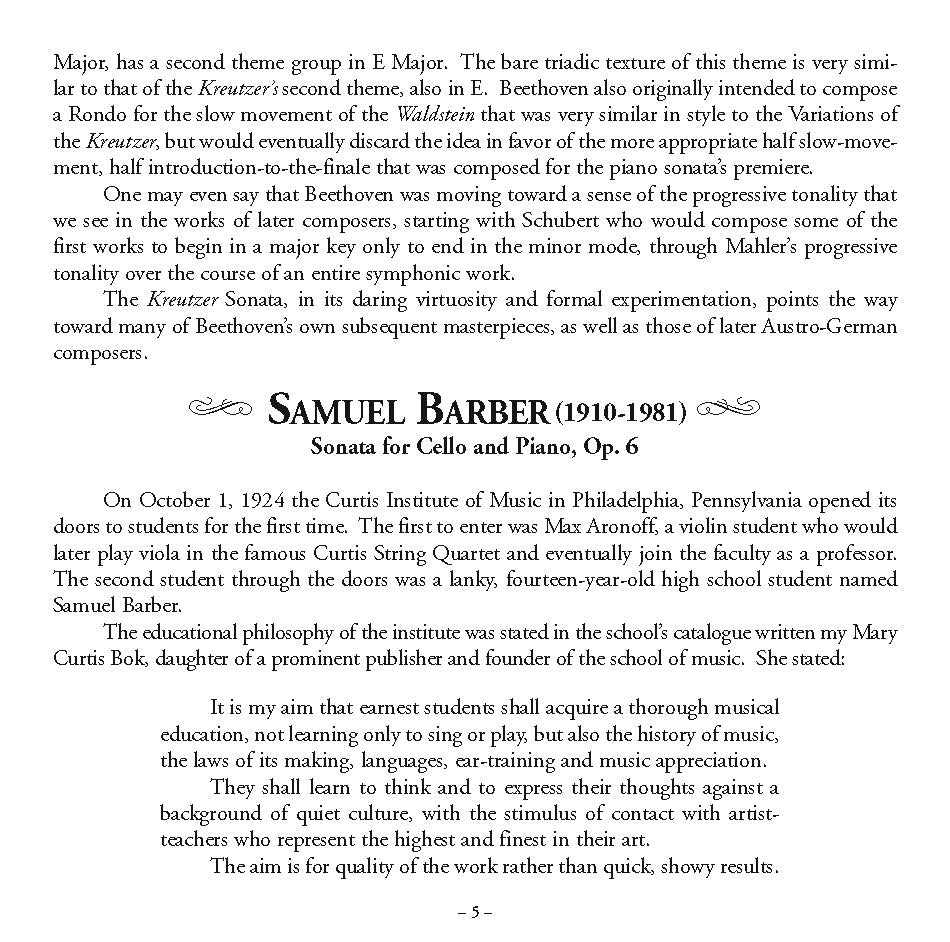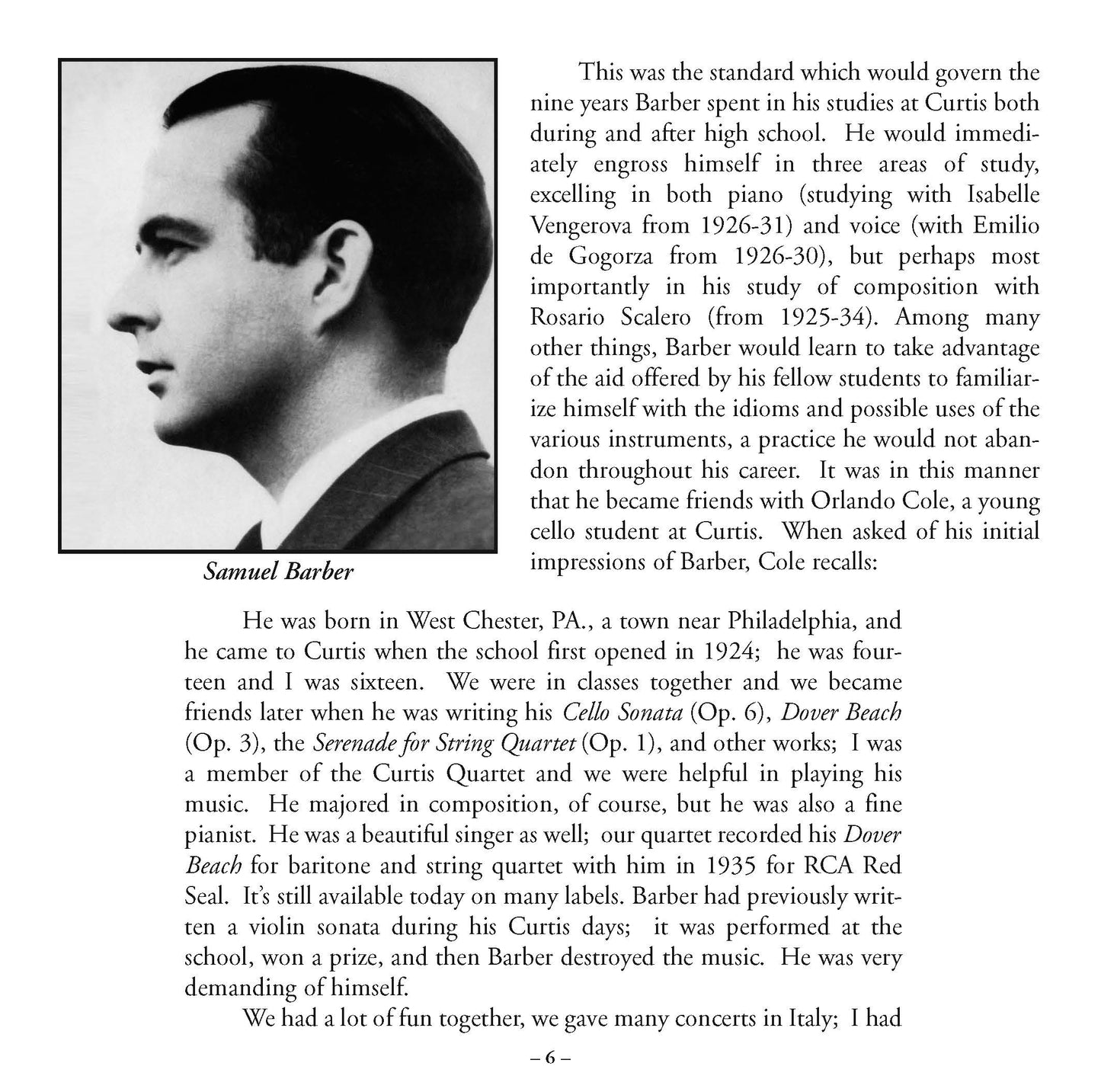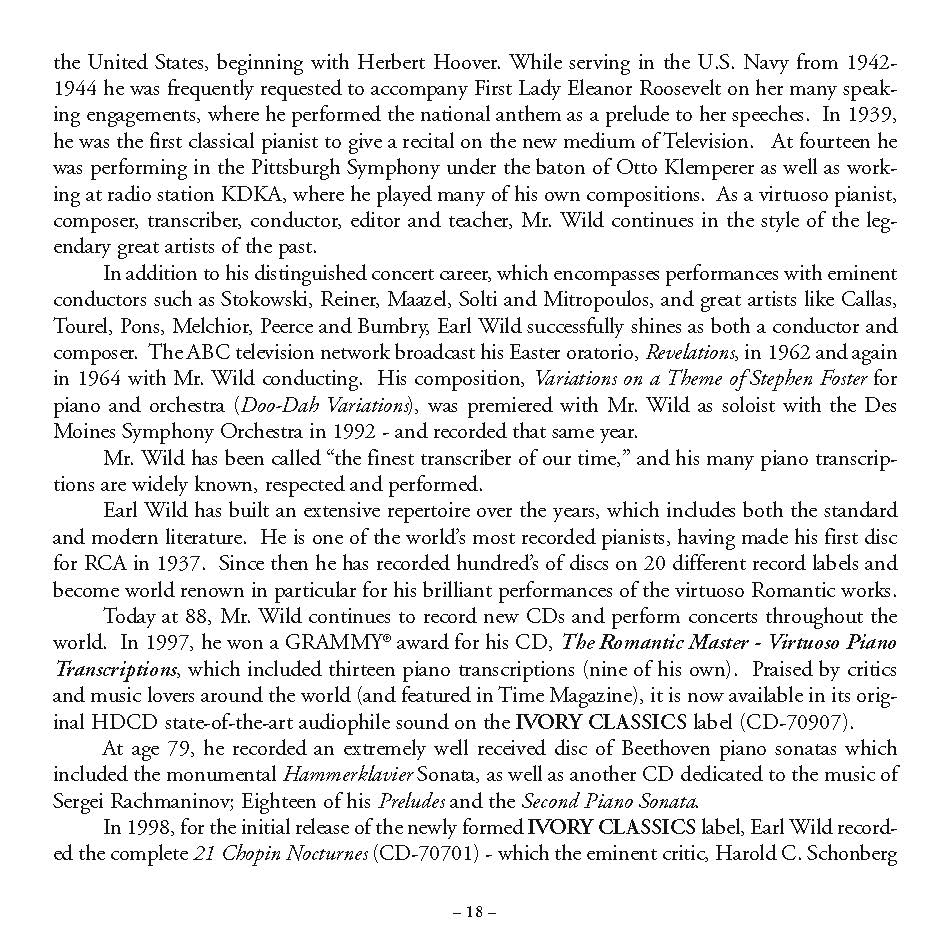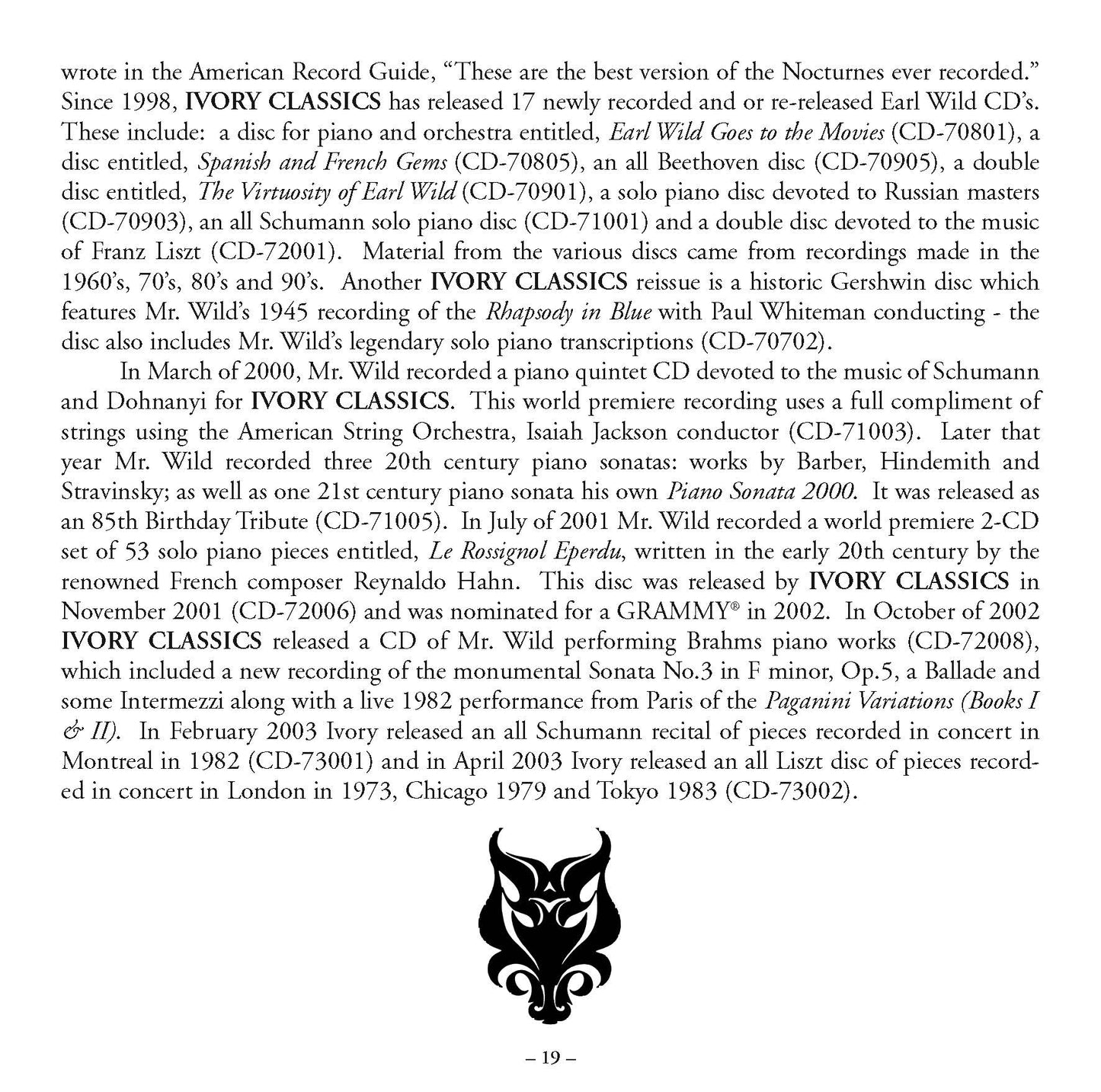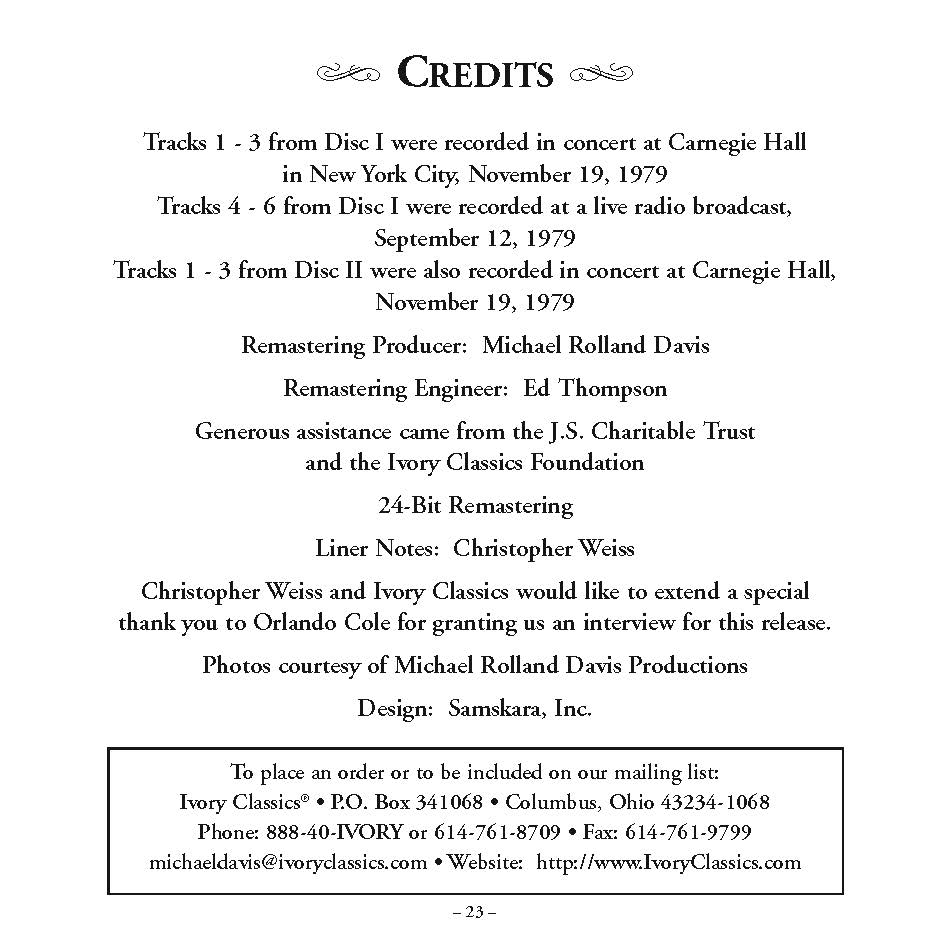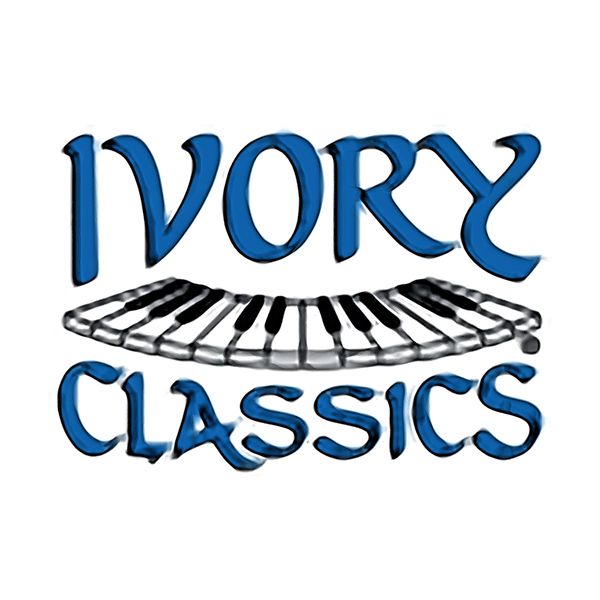1
/
of
24
Wolf Trap Chamber Group - 'Live' from Carnegie Hall 1979
Wolf Trap Chamber Group - 'Live' from Carnegie Hall 1979
Regular price
¥2,400 JPY
Regular price
Sale price
¥2,400 JPY
Unit price
/
per
Couldn't load pickup availability
Ivory Classics CD-73003(2CDs)
Wolf Trap Chamber Group 'Live' in Carnegie Hall 1979
-- DISC 1 --
Ludwig van Beethoven (1770-1827):
Sonata for Piano and Violin No. 9 in A Major Op. 47 'Kreutzer'
1-01. 1st Mvt.: Adagio sostenuto - Presto - Adagio13:30 ('79)
1-02. 2nd Mvt.: Andante con Variazione14:27 ('79)
1-03. 3rd Mvt.: Finale (Presto)08:15 ('79)
piano: Earl Wild
violin: Oscar Shumsky
Samuel Barber (1910-1981):
Sonata for Violincello and Piano Op. 6 (1932)
1-04. 1st Mvt.: Allegro ma non troppo08:16 ('79)
1-05. 2nd Mvt.: Adagio - Presto - Adagio04:14 ('79)
1-06. 3rd Mvt.: Allegro appassionato05:55 ('79)
piano: Earl Wild
cello: Charles Curtis
-- DISC 2 --
Peter Iyich Tchaikovsky (1840-1893):
Trio for Piano, Violin and Cello in A Minor Op. 50
2-01. Pezzo elegiaco (Moderato assai - Allegro giusto)18:20 ('79)
2-02. A. Tema con Variazioni (Andante con moto)17:53 ('79)
2-03. B. Variazione finale e Coda (Allegretto risoluto e con fuoco - Andante con moto)07:03 ('79)
Piano: Earl Wild
Violin: Oscar Shumsky
Cello: Charles Curtis
Producer: Michael Rolland Davis
Engineer: Ed Thompson
Total Time: Disc 1 - 54:53
Total Time: Disc 2 - 43:23
Piano: Baldwin
Remastering Producer: Michael Rolland Davis
Remastering Engineer: Ed Thompson
24-Bit Remastering (ADD)
(2-CDs)'Live' in Carnegie Hall 1979 Oscar Shumsky - Earl Wild - Charles Curtis 24-Bit Remastering (ADD)
Disc.Reviews
A magnificent live Kreutzer brings power and passion from two virtuosos
A towering performance of the Kreutzer Sonata; I couldn't resist the temptation to repeat the experience immediately. Performance is the operative word - with Shumsky and Wild 'living' the unfolding musical events as they present them to an enthusiastic and rather noisy audience. Both outer movements are taken at a true presto, and the lyrical intensity of Shumsky's projection of the second theme stems, in part, at least, from the minimal slackening of the basic tempo. The first movement has an extremely passionate character, Shumsky and Wild making Beethoven's sforzandi and fortissimi speak in a vividly expressive way. The power of the playing is tempered by Shumsky's fine tonal control and by the magnificent balance of Wild's chord playing. The grumpiest of Beethoven's closely spaced left-hand chords sound clear and resonant. In the Andante, the variations take over from one another to create an impressive, cumulative effect, and the finale has an infectiously unbuttoned spirit.
Perhaps inevitably, the rest comes as an anti-climax. Barber's youthful but highly characteristic and dramatic Sonata is very well done, however, the 19-year-old Charles Curtis rising impressively to the challenge of partnering Wild. In the Tchaikovsky the recorded balance isn't always satisfactory - I suspect the engineers changed the levels during the performance. There are also some strange glitches in the sound at the end of track 2, just before the finale. Despite many wonderful moments - Wild's superb, magical playing of the Mazurka variation is one example - the account doesn't quite have the sustained inspiration of the Beethoven. But it's still magnificent playing, in the grand manner.
Gramophone, Feb. 2004
The Concerts at Wolf Trap, as with Marlboro, saw some distinguished music making. The trio performance here unites two astonishing talents, Shumsky and Wild, with the then nineteen-year-old Charles Curtis. None of the performances are actually from Wolf Trap itself. The Kreutzer Sonata and the Tchaikovsky Trio derive from a Carnegie Hall concert and the Barber Sonata was recorded from a radio broadcast given by Curtis and Wild. It means no disrespect to the other performances when I say that the gem of this collection is the Kreutzer, played by two musicians who had first met fully forty years before when Shumsky was playing in the NBC under Toscanini and was a member of the Primrose Quartet and Wild was an NBC staffer (his breakthrough live 1942 Gershwin Rhapsody in Blue with Toscanini is on Guild). I saw Shumsky three times. When he played the Elgar Concerto I remember he warmed up by playing along with the first fiddles in the orchestral introduction. Short, stocky, he gave the greatest live performance of the work I've yet heard. It was never my good fortune to hear a recital programme and listening to this one I can measure the loss. This is a wonderfully vibrant performance, intensely dramatic, propelled forward with invincible logic and superbly played. Phrase endings are briskly moved on and whilst there's drama a-plenty the tempo is certainly not the kind of breathless dog fight that Heifetz and Moiseiwitsch made of it (on APR). Wild indulges some massive chordal flourishes (at 7.50) but he is rightly leonine and Shumsky's phrasing has fluidity and elegance. Wild detonates some explosive left hand accents at the climax of the first movement at the end of which the audience breaks out into fervid applause. Quite right too. The Variations second movement again moves with powerful inexorability but each variation is subtly characterised; nothing is taken for granted. The sense of direction is paralleled by the incipient lyricism that both men explore with perfect understanding. Even some elite partnerships flounder in this movement unable to project incident without losing sight of the canvas; Wild and Shumsky are not one of them. The finale is taken at a fine tempo – not too fast for precise articulation or too slow that we get some rhythmic laxity. There's lightness here, too, as well as powerful authority and a properly conclusive sense of triumph. This is a truly remarkable performance and I strongly recommend you hear it.
The Barber Cello Sonata sees a balance between formal power and a keen sense of lean Russian introversion, most palpably so in the opening and longest of the three movements. Curtis has a well-focused tone and reserves its greatest diversity for the brief Adagio start to the second movement (Adagio-Presto-Adagio) in which sun and vibrance play their part as well. All three musicians join for the Tchaikovsky Trio. It marked Curtis' Carnegie Hall debut as well. The lyrical string exchanges are well projected and Wild secures the piano part with powerful concentration. Shumsky proves especially poignant, though strong as well, his tonal inflections familiar from those who heard him play the Tchaikovsky Concerto. The trio dispatch the fugal section of the second movement with considerable aplomb, piano chording is admirable and the ensemble work accomplished and no less so in the finale. Here there is generous sweep and increasingly tragic intensity.
In the final analysis it is in the Kreutzer that we find the greatest performance but the Barber and Tchaikovsky are much more than pendants. They preserve estimable ensemble performances. Notes are full and descriptive and Ivory Classics maintain their happy knack of providing attractive booklets.
Jonathan Woolf, Music Web.com, Feb. 2004
View full details
Wolf Trap Chamber Group 'Live' in Carnegie Hall 1979
-- DISC 1 --
Ludwig van Beethoven (1770-1827):
Sonata for Piano and Violin No. 9 in A Major Op. 47 'Kreutzer'
1-01. 1st Mvt.: Adagio sostenuto - Presto - Adagio13:30 ('79)
1-02. 2nd Mvt.: Andante con Variazione14:27 ('79)
1-03. 3rd Mvt.: Finale (Presto)08:15 ('79)
piano: Earl Wild
violin: Oscar Shumsky
Samuel Barber (1910-1981):
Sonata for Violincello and Piano Op. 6 (1932)
1-04. 1st Mvt.: Allegro ma non troppo08:16 ('79)
1-05. 2nd Mvt.: Adagio - Presto - Adagio04:14 ('79)
1-06. 3rd Mvt.: Allegro appassionato05:55 ('79)
piano: Earl Wild
cello: Charles Curtis
-- DISC 2 --
Peter Iyich Tchaikovsky (1840-1893):
Trio for Piano, Violin and Cello in A Minor Op. 50
2-01. Pezzo elegiaco (Moderato assai - Allegro giusto)18:20 ('79)
2-02. A. Tema con Variazioni (Andante con moto)17:53 ('79)
2-03. B. Variazione finale e Coda (Allegretto risoluto e con fuoco - Andante con moto)07:03 ('79)
Piano: Earl Wild
Violin: Oscar Shumsky
Cello: Charles Curtis
Producer: Michael Rolland Davis
Engineer: Ed Thompson
Total Time: Disc 1 - 54:53
Total Time: Disc 2 - 43:23
Piano: Baldwin
Remastering Producer: Michael Rolland Davis
Remastering Engineer: Ed Thompson
24-Bit Remastering (ADD)
(2-CDs)'Live' in Carnegie Hall 1979 Oscar Shumsky - Earl Wild - Charles Curtis 24-Bit Remastering (ADD)
Disc.Reviews
A magnificent live Kreutzer brings power and passion from two virtuosos
A towering performance of the Kreutzer Sonata; I couldn't resist the temptation to repeat the experience immediately. Performance is the operative word - with Shumsky and Wild 'living' the unfolding musical events as they present them to an enthusiastic and rather noisy audience. Both outer movements are taken at a true presto, and the lyrical intensity of Shumsky's projection of the second theme stems, in part, at least, from the minimal slackening of the basic tempo. The first movement has an extremely passionate character, Shumsky and Wild making Beethoven's sforzandi and fortissimi speak in a vividly expressive way. The power of the playing is tempered by Shumsky's fine tonal control and by the magnificent balance of Wild's chord playing. The grumpiest of Beethoven's closely spaced left-hand chords sound clear and resonant. In the Andante, the variations take over from one another to create an impressive, cumulative effect, and the finale has an infectiously unbuttoned spirit.
Perhaps inevitably, the rest comes as an anti-climax. Barber's youthful but highly characteristic and dramatic Sonata is very well done, however, the 19-year-old Charles Curtis rising impressively to the challenge of partnering Wild. In the Tchaikovsky the recorded balance isn't always satisfactory - I suspect the engineers changed the levels during the performance. There are also some strange glitches in the sound at the end of track 2, just before the finale. Despite many wonderful moments - Wild's superb, magical playing of the Mazurka variation is one example - the account doesn't quite have the sustained inspiration of the Beethoven. But it's still magnificent playing, in the grand manner.
Gramophone, Feb. 2004
The Concerts at Wolf Trap, as with Marlboro, saw some distinguished music making. The trio performance here unites two astonishing talents, Shumsky and Wild, with the then nineteen-year-old Charles Curtis. None of the performances are actually from Wolf Trap itself. The Kreutzer Sonata and the Tchaikovsky Trio derive from a Carnegie Hall concert and the Barber Sonata was recorded from a radio broadcast given by Curtis and Wild. It means no disrespect to the other performances when I say that the gem of this collection is the Kreutzer, played by two musicians who had first met fully forty years before when Shumsky was playing in the NBC under Toscanini and was a member of the Primrose Quartet and Wild was an NBC staffer (his breakthrough live 1942 Gershwin Rhapsody in Blue with Toscanini is on Guild). I saw Shumsky three times. When he played the Elgar Concerto I remember he warmed up by playing along with the first fiddles in the orchestral introduction. Short, stocky, he gave the greatest live performance of the work I've yet heard. It was never my good fortune to hear a recital programme and listening to this one I can measure the loss. This is a wonderfully vibrant performance, intensely dramatic, propelled forward with invincible logic and superbly played. Phrase endings are briskly moved on and whilst there's drama a-plenty the tempo is certainly not the kind of breathless dog fight that Heifetz and Moiseiwitsch made of it (on APR). Wild indulges some massive chordal flourishes (at 7.50) but he is rightly leonine and Shumsky's phrasing has fluidity and elegance. Wild detonates some explosive left hand accents at the climax of the first movement at the end of which the audience breaks out into fervid applause. Quite right too. The Variations second movement again moves with powerful inexorability but each variation is subtly characterised; nothing is taken for granted. The sense of direction is paralleled by the incipient lyricism that both men explore with perfect understanding. Even some elite partnerships flounder in this movement unable to project incident without losing sight of the canvas; Wild and Shumsky are not one of them. The finale is taken at a fine tempo – not too fast for precise articulation or too slow that we get some rhythmic laxity. There's lightness here, too, as well as powerful authority and a properly conclusive sense of triumph. This is a truly remarkable performance and I strongly recommend you hear it.
The Barber Cello Sonata sees a balance between formal power and a keen sense of lean Russian introversion, most palpably so in the opening and longest of the three movements. Curtis has a well-focused tone and reserves its greatest diversity for the brief Adagio start to the second movement (Adagio-Presto-Adagio) in which sun and vibrance play their part as well. All three musicians join for the Tchaikovsky Trio. It marked Curtis' Carnegie Hall debut as well. The lyrical string exchanges are well projected and Wild secures the piano part with powerful concentration. Shumsky proves especially poignant, though strong as well, his tonal inflections familiar from those who heard him play the Tchaikovsky Concerto. The trio dispatch the fugal section of the second movement with considerable aplomb, piano chording is admirable and the ensemble work accomplished and no less so in the finale. Here there is generous sweep and increasingly tragic intensity.
In the final analysis it is in the Kreutzer that we find the greatest performance but the Barber and Tchaikovsky are much more than pendants. They preserve estimable ensemble performances. Notes are full and descriptive and Ivory Classics maintain their happy knack of providing attractive booklets.
Jonathan Woolf, Music Web.com, Feb. 2004




